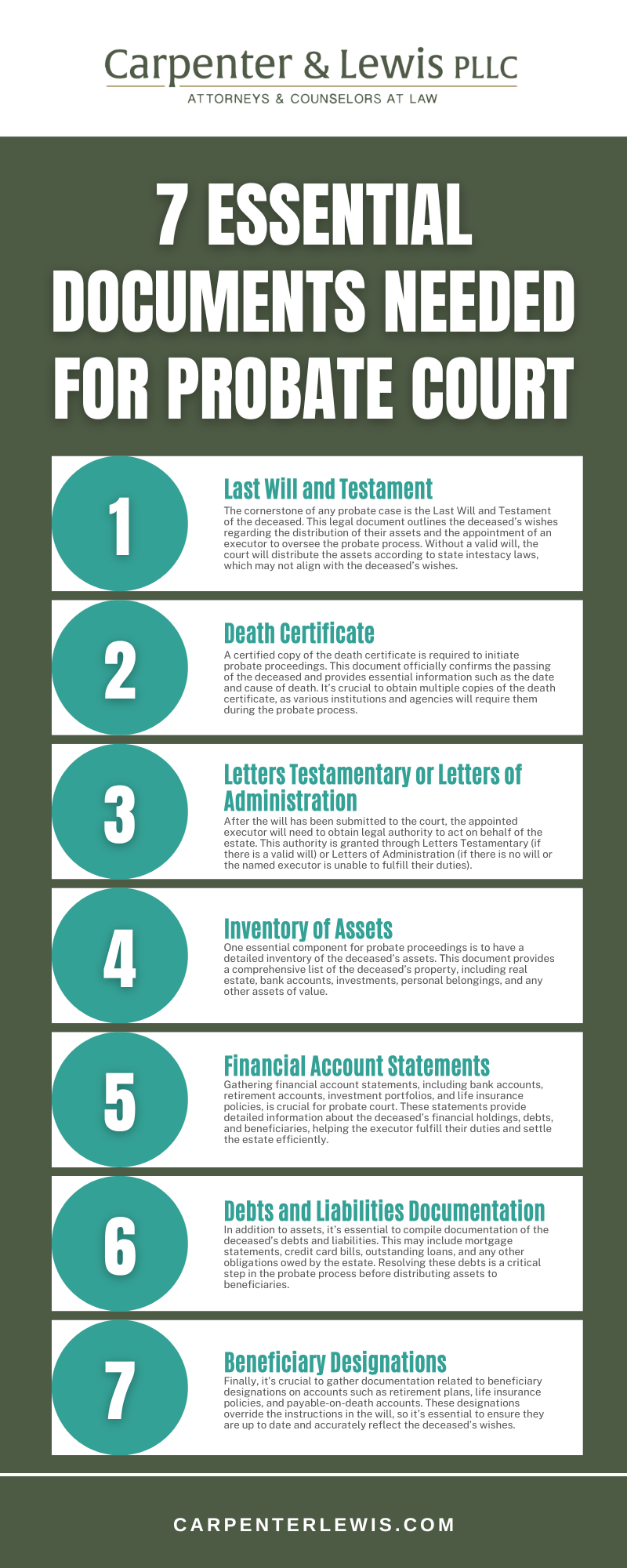Probate Lawyer Knoxville, TN
Dedicated Legal Representation
Our Knoxville, TN probate lawyer is dedicated to bringing our clients the best we have to offer. With over 30 years of experience, we know the strongest results stem from when we’re focused on you and your needs. We also believe in the importance of building trust through personal face-to-face relationships. Our firm helps Tennessee clients with drafting wills, drafting trusts, settling probate estates, settling probate trusts, business planning, and more. If you need assistance with a probate case, contact Carpenter & Lewis PLLC today.
Table of Contents
Probate Law In Tennessee
Probate refers to a court supervised process that can be required after someone dies.
Probate gives somebody, typically the closest surviving family member, legal authority to gather the decedent’s assets, pay their debts and taxes, and transfer those assets to the people that were identified to inherit from the estate of the decedent according to the will or a court order, if there was no will.
Probate can take six months to a year, though this can go on longer if there is a fight involving the beneficiaries of the will. This is rare, but it can happen. Having a good probate lawyer in Knoxville, TN that is focused on the probate process itself can help you better understand why such fights may occur.
Not every asset needs to go through probate, just assets that the deceased person owned in their own name need to go through probate. Other assets pass to the new owners without oversight from the probate court. Assets going through probate court are called part of the “probate estate”.
Some common examples of assets that aren’t part of the probate estate:
- Property that is held in joint tenancy, such as a bank account, a home, or a car. It does not go through probate as it has a second owner, and the surviving owner retains the property outright.
- Property held in tenancy by the entirety, which means the person owned the real estate with their spouse, they’ll avoid probate court because ownership goes to the surviving spouse.
- Payable-on-death bank accounts, or POD, is a bank account that goes directly to the beneficiary of the account when the account holder dies.
- Assets that are registered in a transfer-on-death form, this is a form that Tennessee residents can feel out and anything registered on this form are transferred directly to the beneficiary identified on the form without probate.
- Life insurance proceeds from life insurance policies specify a beneficiary, so they do not require a probate court.
- Retirement funds do not go through probate because the account holder has designated a beneficiary of those proceeds.
- Living trust assets are held in the name of a living trustee, so they do not go through probate.
Essential Documents Needed For Probate Court
When a family is grieving over the loss of a loved one, the thought of facing the probate process can feel both overwhelming and daunting, which is why it may be in your best interest to seek the services of our qualified Knoxville probate lawyer. Here are seven key documents that will be needed for probate:
- Last Will And Testament
This legal document outlines the deceased’s wishes regarding the distribution of their assets and the appointment of an executor to oversee the probate process. Without a valid will, the court will distribute the assets according to state intestacy laws, which may not align with the deceased’s wishes.
- Death Certificate
A certified copy of the death certificate is required to initiate probate proceedings. This document officially confirms the passing of the deceased and provides essential information such as the date and cause of death. It’s crucial to obtain multiple copies of the death certificate, as various institutions and agencies will require them during the probate process.
- Letters Testamentary Or Letters Of Administration
After the will has been submitted to the court, the appointed executor will need to obtain legal authority to act on behalf of the estate. This authority is granted through Letters Testamentary (if there is a valid will) or Letters of Administration (if there is no will or the named executor is unable to fulfill their duties). These documents empower the executor to manage the deceased’s assets, pay debts, and distribute inheritances according to the will or state law.
- Inventory Of Assets
This information provides a comprehensive list of the deceased’s property, including real estate, bank accounts, investments, personal belongings, and any other assets of value. Our Knoxville probate lawyer will share that accurately valuing and documenting these assets ensures transparency and fairness in the distribution process.
- Financial Account Statements:
Gathering financial account statements, including bank accounts, retirement accounts, investment portfolios, and life insurance policies, is crucial for probate court. These statements provide detailed information about the deceased’s financial holdings, debts, and beneficiaries, helping the executor fulfill their duties and settle the estate efficiently.
- Debts And Liabilities Documentation
This may include mortgage statements, credit card bills, outstanding loans, and any other obligations owed by the estate. Resolving these debts is a critical step in the probate process before distributing assets to beneficiaries.
- Beneficiary Designations
Finally, it’s crucial to gather documentation related to beneficiary designations on accounts such as retirement plans, life insurance policies, and payable-on-death accounts. These designations override the instructions in the will, so it’s essential to make sure they are up to date and accurately reflect the deceased’s wishes.
Our dedicated team at Carpenter & Lewis PLLC are available to guide you through the process with care and legal guidance.
Knoxville Probate Infographic
Estate Law Statistics
According to a survey conducted by Caring.com, more than 60 percent of Americans do not have wills drafted or any other estate planning tools in place. That comes out to two out of every three Americans.
Under Tennessee law, if you don’t have an estate plan in place that specifies what should happen to your assets when you die, they will be distributed per the laws of the state. This may not be the way you would want your assets given away.
Make sure you have a solid estate plan in place that will not end up in a long, dragged-out probate process. Call our office to speak with one of our probate lawyers for legal assistance.
Probate FAQs
Your Knoxville, TN probate lawyer can help you deal with the aftermath of your loss, especially if there are any disputes. This is where assistance from a knowledgeable attorney in estate management becomes indispensable.
How Do I Know If I Need A Probate Lawyer?
If you find yourself responsible for handling the estate of someone who has passed away, it may be wise to consult with a legal professional who specializes in estate management. This is particularly important if the estate includes multiple assets such as real estate, stocks, and other investments that require formal probate proceedings. Additionally, if there are any disputes among the heirs or potential creditors claiming against the estate, having an experienced attorney by your side can be invaluable.
How Long Does The Probate Process Usually Take With A Lawyer?
The duration of the probate process can vary significantly depending on the complexity of the estate and the specific laws of the state where the deceased resided. Typically, a straightforward estate might be settled within six to twelve months when a lawyer is involved. However, if there are complications such as disputes over the will or claims made by creditors, the process can extend significantly, often taking several years to resolve fully.
How Can I Avoid Probate?
One common way to circumvent the probate process is by organizing your assets so that they pass directly to beneficiaries upon your death. This can be achieved through mechanisms such as living trusts, joint ownership, and designations of beneficiaries on policies like life insurance and retirement accounts. These strategies can provide a smoother transition of your assets to your loved ones without the need for court involvement.
What Are The Consequences Of Avoiding Probate?
While avoiding probate can expedite the distribution of assets to your beneficiaries, there are potential consequences to consider. Without the probate process, there is less oversight to ensure that your estate is distributed according to your wishes. This can increase the risk of disputes among potential heirs. Furthermore, creditors might have a harder time claiming debts, which could potentially leave less protection for the deceased’s debtors.
What Can A Probate Attorney Do To Help With Disputes Over Inheritance?
A probate attorney who specializes in estate management is well-equipped to handle inheritance disputes. They can offer mediation services to help disputing parties reach an agreement that honors the wishes of the deceased and upholds legal standards. If a dispute escalates, having a legal professional on your team is essential to navigate the complexities of court proceedings effectively.
Carpenter & Lewis PLLC, Knoxville Probate Lawyer
10413 Kingston Pike, Knoxville, TN 37922
Contact Our Knoxville Law Firm Today
Reach out to us today if you have questions regarding your probate case. At Carpenter & Lewis PLLC, we have four lawyers with versatile educations and memberships. Put our knowledge and experience to work for you and your loved ones. We’re here to support you when you need it most.
Carpenter & Lewis Probate Attorney Consultation:

For a consultation with one of the probate attorneys at Carpenter & Lewis, please call (865) 690-4997 or you may prefer to send an e-mail to: [email protected]. Consultations are by appointment only.

Request A Consultation
Client Review
“We own several businesses and have had the pleasure of working with Stephen and his team for over 9 years now. He always comes through in a pinch. They have assisted us with leases, estate planning, company formations and even landlord issues. I highly recommend them for all your business attorney needs!”
Mary Ellen Nichols
Schedule Your Appointment
10413 Kingston Pike, Suite 200
Knoxville, Tennessee 37922
New Clients: (865) 509-9600
Existing Clients: (865) 690-4997
Facsimile: (865) 690-4790
10413 Kingston Pike, Suite 200 Knoxville, Tennessee 37922
Also Serving: Farragut TN
New Clients: (865) 509-9600
Existing Clients: (865) 690-4997
Facsimile: (865) 690-4790
Estate Planning Lawyer Knoxville TN | Wills Lawyer Knoxville TN | Probate Lawyer Knoxville TN | Elder Law Lawyer Knoxville TN | Estate Settlement Attorney Knoxville TN | Wills Lawyer Farragut TN | Trust Lawyer Farragut TN | Probate Lawyer Farragut TN | Estate Planning Lawyer Maryville TN | Probate Lawyer Maryville TN | Wills Lawyer Maryville TN | Elder Law Lawyer Maryville TN | Trust Lawyer Maryville TN



